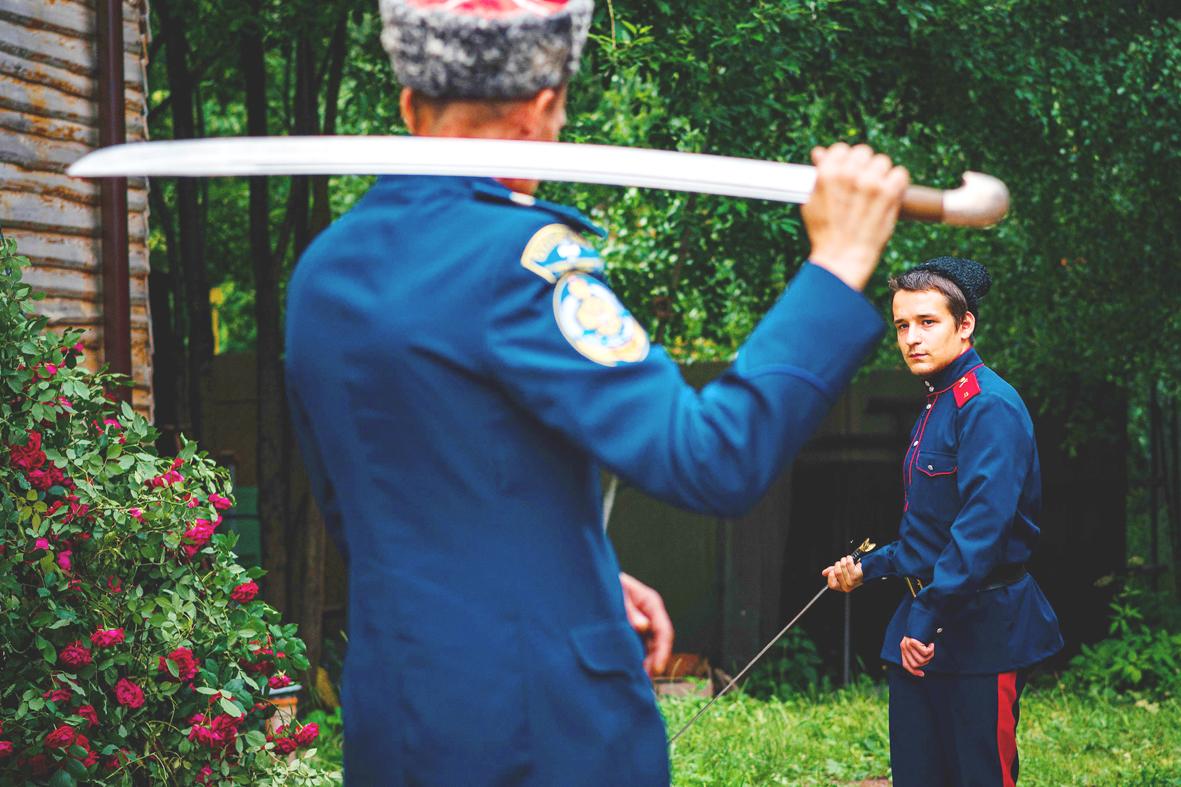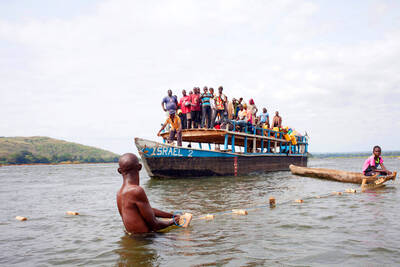Wearing a blue woollen uniform topped with a black fur hat, Snezhana Golubeva’s son pursed his lips as he slowly turned a curved sword in a leafy village outside Moscow.
In a meadow nearby, Golubeva was wandering through tall grass picking wildflowers for herbal remedies.
She did not expect to spend the holidays in a village outside Moscow, but border closures prompted by the COVID-19 pandemic left her and many other Russians scrambling for alternatives and fueling a revival of old Russian pastimes.

Photo: AFP
“Usually, I go with my son to Greece or Italy for a week or two or even a month,” said Golubeva, a 40-year-old beautician. “This summer we’ve come here for religious services and to join all the activities here.”
Instead of lazing on European beaches, Muscovites who fled to summer homes are watching Soviet-era films and learning about the healing properties of wild plants.
Golubeva and her 14-year-old son go twice a week to workshops led by Cossacks, who once guarded the southern frontiers of czarist Russia in Alyaukhovo, east of Moscow.
One recent weekend, 69-year-old army officer Nikolai Dolgopol was teaching Cossack songs and sword fighting.
“With no Thailand or Turkey, quite a few young people are coming here to learn the traditional values they’ve been missing,” he said.
While Golubeva’s son learned to wield a Cossack saber, she headed to the meadows for a guided nature walk with a group of women.
Marina Vasilyeva, who worked in the Soviet Union’s broadcasting governing body, was sharing tips on plant-based remedies to boost the immune system.
“It’s no big deal,” said Ksenia Akimova, a 14-year-old student holding a huge bunch of plants. “Instead of going to Montenegro, I’m learning about the traditions of our forefathers.”
A strict lockdown in March prompted an exodus from the capital to country cottages. Almost half of Russians own second homes known as dachas, allocated to them during the Soviet era.
Those without rushed to rent, with searches for summer homes near Moscow surging more than fivefold in April, according to property search site to Cian.ru.
The residences have served as a refuge before. During the economic crisis after the collapse of the Soviet Union, many families grew food in dacha vegetable patches.
More than half of respondents to an April survey by travel site Tutu.ru said that dachas were “the best way” to escape the pandemic.
Families this year were also much less likely to send their children away to summer camps, with 83 percent of Muscovites saying that children would stay at home, according to the Russian government’s virus information Web site.
This mass move from the city drove a threefold surge in sales of hanging chairs, while sales of inflatable paddling pools, hammocks and recliners doubled, according to Avito.ru classified ad site.
One recent Saturday evening, dacha dwellers in Yermolino, a village 50km from Moscow, sat in traditional cinema seats arranged on grass in front of a large outdoor screen.
Alexander Mamayev, a projectionist who salvaged 1,500 film reels from the local council, uses vintage projectors to stage outdoor screenings.
In spite of the mosquitoes, the screenings are a hit, said Mamayev, a 32-year-old lawyer.
As no one has gone on holiday, “our audiences have doubled”, he said. “Cinema is another way to travel.”
Open-air shows are a Soviet-era tradition, when projectionists would bring the latest releases to remote collective farms, he said.
Mathematician Nikolai Moshchevitin and his daughter were among the audience watching Soviet cult classic The Mystery of the Third Planet — a 1981 animation telling the story of a space expedition to find new animals for Moscow Zoo.
Since conferences in Europe and China on are hold, the 53-year-old told reporters that the screenings were “a good way of traveling to my childhood.”

‘IN A DIFFERENT PLACE’: The envoy first visited Shanghai, where he attended a Chinese basketball playoff match, and is to meet top officials in Beijing tomorrow US Secretary of State Antony Blinken yesterday arrived in China on his second visit in a year as the US ramps up pressure on its rival over its support for Russia while also seeking to manage tensions with Beijing. The US diplomat tomorrow is to meet China’s top brass in Beijing, where he is also expected to plead for restraint as Taiwan inaugurates president-elect William Lai (賴清德), and to raise US concerns on Chinese trade practices. However, Blinken is also seeking to stabilize ties, with tensions between the world’s two largest economies easing since his previous visit in June last year. At the

UNSETTLING IMAGES: The scene took place in front of TV crews covering the Trump trial, with a CNN anchor calling it an ‘emotional and unbelievably disturbing moment’ A man who doused himself in an accelerant and set himself on fire outside the courthouse where former US president Donald Trump is on trial has died, police said yesterday. The New York City Police Department (NYPD) said the man was declared dead by staff at an area hospital. The man was in Collect Pond Park at about 1:30pm on Friday when he took out pamphlets espousing conspiracy theories, tossed them around, then doused himself in an accelerant and set himself on fire, officials and witnesses said. A large number of police officers were nearby when it happened. Some officers and bystanders rushed

Beijing is continuing to commit genocide and crimes against humanity against Uyghurs and other Muslim minorities in its western Xinjiang province, U.S. Secretary of State Antony Blinken said in a report published on Monday, ahead of his planned visit to China this week. The State Department’s annual human rights report, which documents abuses recorded all over the world during the previous calendar year, repeated language from previous years on the treatment of Muslims in Xinjiang, but the publication raises the issue ahead of delicate talks, including on the war in Ukraine and global trade, between the top U.S. diplomat and Chinese

RIVER TRAGEDY: Local fishers and residents helped rescue people after the vessel capsized, while motorbike taxis evacuated some of the injured At least 58 people going to a funeral died after their overloaded river boat capsized in the Central African Republic’s (CAR) capital, Bangui, the head of civil protection said on Saturday. “We were able to extract 58 lifeless bodies,” Thomas Djimasse told Radio Guira. “We don’t know the total number of people who are underwater. According to witnesses and videos on social media, the wooden boat was carrying more than 300 people — some standing and others perched on wooden structures — when it sank on the Mpoko River on Friday. The vessel was heading to the funeral of a village chief in